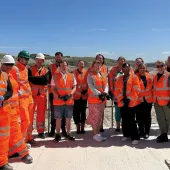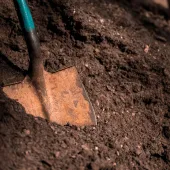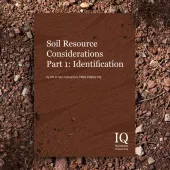Institute of Quarrying 2013 Annual Conference Review

First published in the December 2013 issue of Quarry Management
Our people – our greatest resource
This year’s Institute of Quarrying annual conference, which was sponsored by Caterpillar dealers Finning, took place on Thursday 10 October at the Hinckley Island Hotel, in Leicestershire. Drawing inspiration from a quotation by Sir Winston Churchill that ‘Healthy citizens are the greatest asset any country can have’, the theme of the 2013 event was centred on the industry’s greatest resource – its people. This subject had particular resonance given the challenging economic times faced by the industry over the past few years, whereby some businesses, in seeking to maintain a competitive advantage, have failed to maximize the potential of the resource they should value the most – their people.
Around 115 delegates were welcomed to the event and introduced to the day’s proceedings by Colin Jenkins, president of the Institute of Quarrying, after which the conference opened with a keynote address by Jonathan Hurley, business development manager with Volvo Construction Equipment, on what it takes to be listed among the Sunday Times’ ‘Best 100 Companies’. Having seen Volvo CE rise from 46th position last year to 34th position this year, Mr Hurley outlined the key points used to determine the best companies and explained how a number of critical factors, such as personal growth and development, physical well-being, effective leadership etc, were key to achieving the levels of employee engagement necessary to realize a successful outcome. ‘People certainly are our greatest asset and must be protected,’ said Mr Hurley.
Before the next speaker there was the usual short pause in the conference proceedings for the traditional presentation of prizes and awards for the Institute’s Professional Examination, which saw Fred Locke of Imerys picking up the prestigious Leonard Clugston Prize for the best overall results (see table on p40 for the full list of winners and runners-up). In addition, Professor Iain Stewart, chair of geoscience communications at the School of Geography, Earth and Environmental Sciences at Plymouth University and presenter of a number of geoscience-themed programmes on BBC TV, was presented with the Ruston Bucyrus Award for delivering an excellent McPherson Lecture at last year’s annual conference in Glasgow.
Once all the prizes and awards had been presented, the morning session theme of ‘health and well-being’ continued with Chris Wakeham, managing director of Hampton Knight, specialist providers of integrated health solutions, taking the stage to give a presentation entitled ‘Fitness for Work’, which focused on the problem of drug and alcohol misuse that persists among a minority of workers. Mr Wakeham explained how it was vital to manage the issue effectively by having a ‘robust and layered’ drug and alcohol policy with clear purpose, scope, guidelines and rules, as well as providing suitable ongoing training for managers, supervisors and employees. He also discussed how best to test for drugs and alcohol in a legally defensible way, when to conduct such testing, and the importance of providing proactive help, support and counselling.
Next to take the stage was Vicky Ubhi, senior manager with OHSB Ltd, specialist practitioners in health and safety provision, who spoke about mobile occupational health surveillance and the benefits of proactive health screening. She explained how a good occupational health service can help a company achieve good health and well-being in its workforce by: assisting in the management of sickness/absence; reducing stress-related illness; helping to fulfil legal obligations and reduce the risk of legal action; demonstrating to the workforce that the company is a caring and committed employer, which, in turn, leads to improved employee motivation, dedication and happiness; and, ultimately, raising productivity and profits.
Following the mid-morning coffee break, Dr Rob Ellis, project manager with the HSE, gave a presentation on respiratory protective equipment (RPE). He began by pointing out that 12,000 deaths a year in the UK are the result of respiratory illnesses due to past exposure to dust and other fine particles. Although adequate RPE may be provided by employers, Dr Ellis cited a lack of training and proper fit testing as reasons why compliance with RPE guidelines often tends to be low. The aim, he said, was to achieve ‘proficiency’ in the use of RPE through a high level of competence and control. He also emphasized the importance of correct storage and maintenance of RPE, and discussed the various sources of advice, information and guidance that are available, such as the HSE’s recently revised ‘Respiratory protective equipment at work: A practical guide (HSG53).
The final presentation before lunch was by Neil Hodgson, risk services director with Oval Insurance Broking Ltd, who spoke about claims risk management and recent Ministry of Justice changes to the claims handling process. With the number of employer liability claims continuing to increase, along with the legal costs associated with each claim, these changes are designed to speed up the claims process in order to save time and money, but will require companies to act and react much quicker than before in the event of employer and public liability claims.
After lunch Peter Barkwill, managing director of John Wainwright & Co. Ltd and chairman of the Institute of Quarrying, summarized the morning session and set the scene for the afternoon session with its emphasis on ‘people management’. This session began with an interactive learning experience entitled ‘People Empowerment’, performed by two actors from behavioural safety training specialists McNaughton McGregor. Their powerful drama-based presentation centred on two characters from a fictitious quarry company who had been involved in a near-miss incident on site. They began by showing how the incident had been dealt with inadequately and inappropriately at the time; then, with the benefit of input from conference delegates, the scenario was repeated to show how the incident could and should have been handled far more effectively.
Next to take the stage was Clare Mayo, human resources director with Hanson, who gave a presentation entitled ‘Managing Stress’. Clare explained how the pressures of home life combined with significant or unwanted pressures at work can be extremely stressful. Pointing out that no two people are affected in the same way, she examined the physical and emotional signs and symptoms of stress, and said it was important to recognize and resolve the issue before it became debilitating. Although there is no ‘magic bullet’ to cure stress, Clare said the health of an individual can play a big part in managing the problem. She recommended the use of personal health logs (diet, exercise, weight etc) and also outlined the benefits of an effective employee assistance programme (EAP), which, she said, would benefit both employers and employees.
The penultimate speaker of the day was Nick Eastwood, senior mining consultant with Hunter Personnel, who spoke about recruitment within the extractives sector. He began by outlining some of the critical risks the industry faces, such as an ageing skills base, loss of knowledge, increased competition for professional skills, perceived image of the industry etc, as well as areas where skills shortages are most acute, such as resource geologists, geotechnical engineers and mine and quarry engineers. Mr Eastwood then focused on what employers need to do to attract the best candidates and retain the best employees, and what potential employees should do to improve their chances of employment. In summary, he said the industry needed to promote itself more effectively to schools and colleges, and companies needed to ‘nurture graduates’. He added that collaboration between the Institute of Quarrying and the University of Derby was very useful, but that the real benefits to arise from this would be in 10–15 years time.
This year’s conference proceedings concluded with the second keynote address of the day, this time by Colin Mew, HM Principal Inspector of Health & Safety with the HSE. Speaking on the theme of ‘Worker Involvement’, he explained how earlier improvements in ‘Hard Target’ and major accident trends had reached a plateau and stalled, and said the industry now needed to do something different to get back on a downward trend. He suggested that changing workers’ behaviour was key to this, and said this could be achieved by developing manager/worker partnerships to jointly solve health and safety problems, and by enhancing worker engagement through consultation and participation. In conclusion, Mr Mew urged the industry to engage more with the QNJAC working groups and the courses offered by MPQC. ‘This is, after all, a can do industry,’ he said.
Quarry Technology Diploma Examination Prize Winners 2013
Leonard Clugston (Average of all nine modules)
Prize Winner: Fred Locke (Imerys)
Reginald W Coles Award (Average of two Health, Safety & Environment part B)
Prize Winner: Fred Locke (Imerys)
Runner-up: John Mawer (Tarmac)
Peter Preston Award (Average of two quarry technology part A)
Prize Winner: Jonathan Hodgins (Imerys)
Runner up: Fred Locke (Imerys)
Tilcon Award (Business Management)
Prize Winner: John Pritchard (Sibelco)
Runner-up: Jonathan Hodgins (Imerys)
Ransomes Rapier Award (Average of two engineering modules)
Prize Winner: Gennara Iaconianni (Imerys)
Runner-up: John Pritchard (Sibelco)
Rexnord Award (Quarry Blasting)
Prize Winner: Stephen Lashley (Skelair)
Runner-up: Neil Forsythe (Tarmac)
Goodwin Barsby Award (Construction Materials)
Prize Winner: John Mawer (Tarmac)
Runner-up: Rob Quayle (CEMEX)
Springbank Quaich (IQ Scottish Branch Award)
Prize Winner: Don McLean (Breedon Aggregates)
Longcliffe Calcium Carbonates Awards Foundation Year (Average of three modules)
Prize Winner: Julian Veal (Huntsmans)
Runner-up: Matthew Yeates (SRC)
Longcliffe Calcium Carbonates Awards Certificate Year (Average of four modules)
Prize Winner: Sue Leverton (Aggregate Industries)
Runner-up: Adam Garbutt (Saint Gobain)
- Subscribe to Quarry Management, the monthly journal for the mineral products industry, to read articles before they appear on Agg-Net








